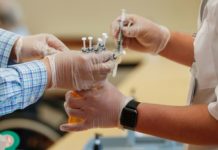Eisai Co., Ltd and University College London announced that they have commenced preparations for Phase I clinical studies on E2814
The first clinical candidate from their drug discovery collaboration, in Alzheimer’s disease patients within fiscal 2018. E2814 is an anti-tau monoclonal antibody which is designed to slow the progression of Alzheimer’s disease and other tauopathies*.
In addition, the research collaboration, agreed in 2012 for an initial period of six years, has been extended for a further 5 years to 2023. It was established as part of Eisai’s Open Innovation strategy to collaborate with leading researchers in order to translate new research findings into innovative treatments for patients with neurodegenerative diseases. E2814 is one outcome out of a portfolio of projects established during the first phase of the collaboration with UCL.
Alzheimer’s disease is a chronic, progressive, neurodegenerative disease characterized by formation of protein deposits known as plaques (made of amyloid-beta protein) and neurofibrillary tangles (made of tau protein) in patient’s brains. Tau “seeds” ** are believed to spread between different areas of the brain as the disease advances. E2814 is uniquely designed to target the tau “seeds”, preventing further build-up of neurofibrillary tangles and thus may slow the course of the disease.
There are an estimated approximately 50 million dementia patients worldwide. As the aging of the global population gathers pace, the number of dementia patients is expected to continue trending upward and increase to approximately 82 million patients in 2030 and approximately 152 million in 2050. 1 Therefore, promoting initiatives to address dementia is a global issue and there are hopes that therapeutic agents that satisfy these unmet medical needs will be developed quickly.
Professor Alan Thompson, Dean of UCL Faculty of Brain Sciences, said “This unique research partnership brings together UCL’s world-class academic research capabilities with the drug discovery expertise of industry. These results highlight the success of bringing together such complementary expertise.”
“Significant unmet medical needs exist for neurodegenerative disorders such as Alzheimer’s disease due to a lack of effective treatments that can prevent disease progression, and Eisai’s mission is to contribute to overcoming these issues.” said Teiji Kimura, Chief Discovery Officer of the Eisai Neurology Business Group. “By combining the knowledge of UCL, which conducts world-class research into neurodegenerative disorders and is the operational hub of the UK Dementia Research Institute, together with the knowledge of Eisai, who possesses a rich pipeline for dementia treatments, we are doing our utmost to link the results of joint research starting with E2814 to new medicines in order to contribute to patients who are awaiting curative therapies as soon as possible.”
About E2814
An anti-tau monoclonal antibody, E2814 is being developed as a disease modifying agent for Alzheimer’s disease and other tauopathies, Phase I clinical studies are expected to commence within fiscal 2018. The drug candidate was discovered as part of the research collaboration between Eisai and UCL and is designed to prevent the spreading of tau protein “seeds” within the brains of affected individuals.
About University College London
UCL was founded in 1826. We were the first English university established after Oxford and Cambridge, the first to open up university education to those previously excluded from it, and the first to provide systematic teaching of law, architecture and medicine. We are among the world’s top universities, as reflected by performance in a range of international rankings and tables. UCL currently has over 38,000 students from 150 countries and over 12,000 staff. Our annual income is more than EUR 1 billion.
About the UK Dementia Research Institute (DRI)
Funded by the Medical Research Council, Alzheimer’s Society and Alzheimer’s Research UK, the UK DRI draws world-leaders in dementia research into a single national institute. UCL is home to the operational headquarters of the UK DRI and forms the hub for research activities across the six national research centres, which are at UCL, the University of Cambridge, Cardiff University, the University of Edinburgh, Imperial College London and King’s College London. By convening world-class dementia researchers to bring about ground-breaking approaches to dementia defined by close collaboration and access to exceptional research resources, the UK DRI aims to find better ways to care for patients.
About Eisai
Eisai Co., Ltd. is a leading global research and development-based pharmaceutical company headquartered in Japan. We define our corporate mission as “giving first thought to patients and their families and to increasing the benefits health care provides,” which we call our human health care philosophy. With approximately 10,000 employees working across our global network of R&D facilities, manufacturing sites and marketing subsidiaries, we strive to realize our human health care philosophy by delivering innovative products in various therapeutic areas with high unmet medical needs, including Oncology and Neurology.
As a global pharmaceutical company, our mission extends to patients around the world through our investment and participation in partnership-based initiatives to improve access to medicines in developing and emerging countries. For more information about Eisai Co., Ltd., please visit www.eisai.com



























